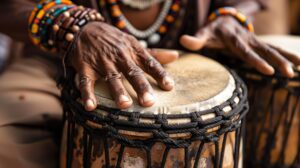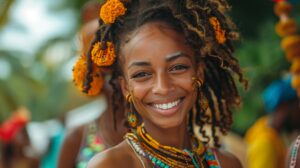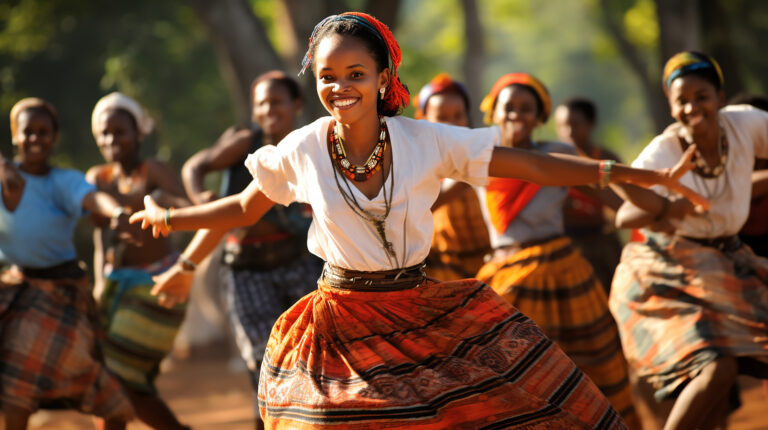Madagascar is home to an array of unique festivals that celebrate its rich culture, heritage, and history. Each festival provides a glimpse into Malagasy life, with vibrant music, dance, and age-old rituals. Here’s a list of some notable festivals in Madagascar, along with their approximate dates:
Alahamady Be
(Malagasy New Year)
- Date: March (dates vary based on the Malagasy lunar calendar)
- Description: The Malagasy New Year, known as Alahamady Be, marks the traditional New Year according to the lunar calendar. Families gather to honor ancestors, participate in rituals, and celebrate with food, music, and dance. Ceremonies involve blessings for the new year and symbolic acts to ensure good fortune and protection.

Santabary Festival
(Rice Harvest Festival)
- Date: April to May (timing depends on the harvest season)
- Description: As rice is a staple food in Madagascar, the Santabary Festival celebrates the end of the rice harvest season. Communities gather to give thanks for a successful harvest through traditional rituals, feasts, and performances. The festival is especially significant in rural areas, where people honor the spirits of nature and ancestors for their agricultural bounty.
Independence Day
- Date: June 26
- Description: Independence Day commemorates Madagascar’s liberation from French colonial rule in 1960. It is celebrated nationwide with parades, fireworks, concerts, and community events. Streets are decorated with flags, and people gather to enjoy traditional food, music, and dance. The day reflects national pride and unity across Madagascar.
Famadihana
(Turning of the Bones)
- Date: Every 5–7 years, typically from June to September
- Description: Famadihana, or the “Turning of the Bones,” is a unique ceremony where families exhume and rewrap the remains of their deceased loved ones. They then dance with the bodies as a sign of respect and connection to ancestors. The festival is celebrated by some Malagasy families and communities, usually in rural areas, and is an expression of Malagasy spirituality and reverence for family heritage.

Donia Festival
- Date: May or June
- Location: Nosy Be
- Description: Donia, meaning “life” in Malagasy, is a cultural and music festival held on the island of Nosy Be. It celebrates the diverse music, dance, and art of Madagascar and attracts performers and visitors from across the island and beyond. The festival showcases the creativity and unity of the Malagasy people and is a favorite among locals and tourists alike.
Madajazzcar Festival
- Date: October
- Location: Antananarivo
- Description: Madajazzcar is an international jazz festival held annually in Madagascar’s capital, Antananarivo. Established in the 1980s, it has become one of the most significant jazz festivals in Africa, bringing together local and international jazz artists for concerts, workshops, and jam sessions. It offers a blend of traditional and contemporary jazz and has become an essential part of the country’s cultural calendar.
Hiragasy Festival
- Date: Various dates throughout the year, with major events typically in July and August
- Description: Hiragasy is a traditional form of Malagasy theater that combines music, dance, and storytelling. This festival is celebrated across Madagascar, especially in rural areas and on national holidays. Troupes perform lively shows featuring songs, dances, and tales that reflect Malagasy folklore, values, and history. The Hiragasy Festival is a cherished expression of Malagasy cultural identity.
Asaramanitra Festival
(Malagasy Christmas)
- Date: December 25
- Description: Although many of the customs are influenced by French colonial history, Christmas in Madagascar, known as Asaramanitra, is celebrated with unique Malagasy traditions. Families gather for meals, exchange gifts, and attend church services. Christmas in Madagascar is marked by a spirit of community, often with outdoor celebrations featuring music and dancing.
Kabiry Festival
- Date: August (dates vary)
- Location: Nosy Mitsio (northern Madagascar)
- Description: This festival, celebrated by the Antakarana people, involves rituals to honor ancestors and traditional leaders. The Kabiry Festival includes offerings, community gatherings, dance, and music. It is an important cultural event for the Antakarana, underscoring their spiritual and historical connection to the island of Nosy Mitsio.
Fire Festivals and OtherRegional Celebrations
- Dates: Various (throughout the year)
- Description: Some Malagasy regions hold fire festivals, celebrating different aspects of Malagasy spirituality, connection to ancestors, and seasonal changes. These can vary in timing and content, often involving ritual dances, music, and ceremonies dedicated to nature spirits and ancestors.
Each festival in Madagascar is more than just a celebration; it’s a vital expression of Malagasy cultural heritage, connecting people to their land, ancestors, and each other. For visitors attending any of these festivals provides a unique perspective on the island’s rich traditions.
